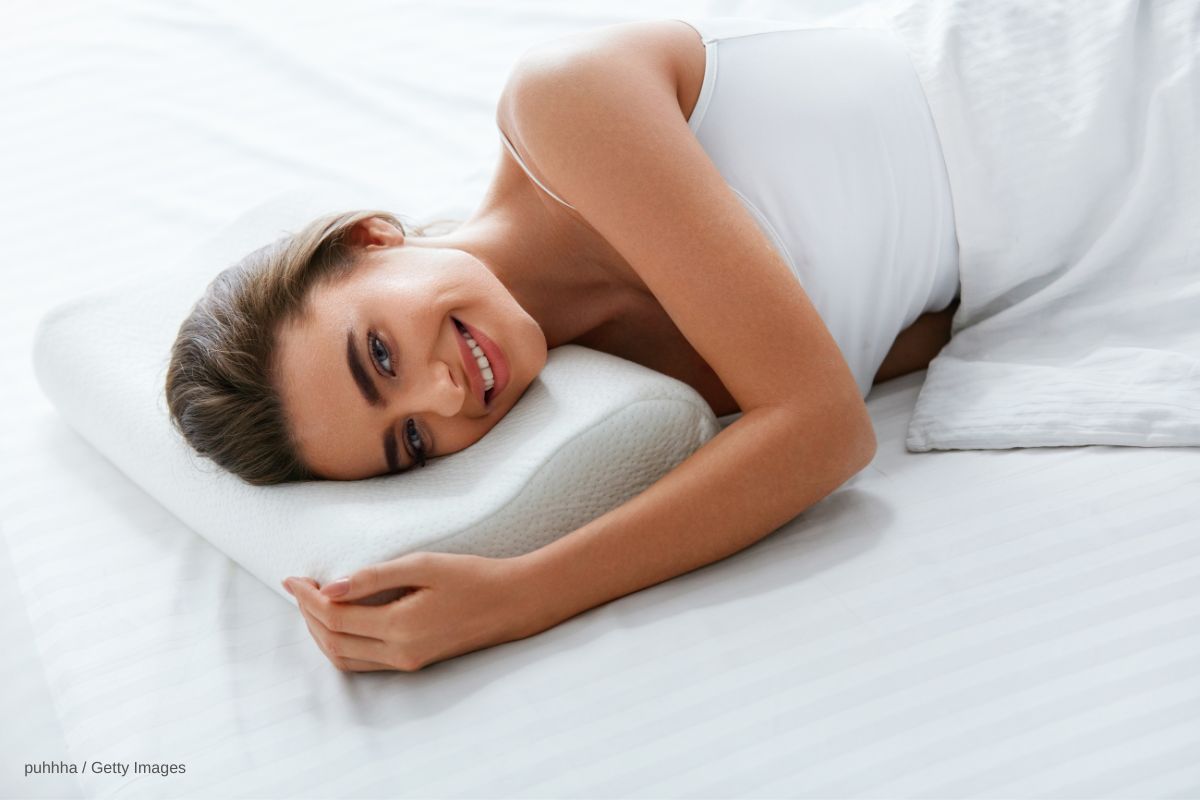Anti-snoring pillows - what is the trend?

Snoring causes discontent in the bedroom - both for those affected and for their bed partners. Anti-snoring pillows are the latest sleep trend designed to put this relationship problem to rest once and for all. The wave-shaped pillows are supposed to effectively reduce back-related snoring and ensure quiet nights. Find out here who the trendy sleep accessory is suitable for and whether it delivers what it promises.
Why is snoring problematic?
When your partner seems to snore loudly all night, your nerves are on edge in the morning. Snoring poses a challenge to many relationships. But before the nuisance leads to separate beds, those affected want a less drastic solution. This is what so-called anti-snoring pillows are supposed to offer - and help both partners to a soothing night's rest. This is important, because snoring can be a health risk. Sooner or later, the noisy breathing can escalate into dangerous breathing pauses that disrupt the cardiovascular system. For this reason alone, particularly heavy snorers should take measures in good time to reduce the disturbing habit. Can a simple step like switching to an anti-snoring pillow eliminate the problem?

What is an anti-snoring pillow?
An anti-snoring pillow is a specially shaped pillow that puts the sleeper in the side position. But why can this position successfully prevent snoring? Surely you know that our body relaxes during sleep. Of course, this also applies to our muscles in the mouth and neck area. Especially when lying on your back, the tongue can easily slip back into the throat and narrow the airways. The result: annoying snoring noises and unpleasantly loud nights. If the affected person also sleeps with their mouth open, the uvula and soft palate can vibrate strongly and cause a veritable snoring concert. Anti-snoring pillows prevent the supine position thanks to special shapes and curvatures. As a result, the sleeper's head should sink to the side and remain there throughout the night to allow free breathing - and effectively curb snoring.
Do anti-snoring pillows work for everyone?
Side sleepers have the advantage because their preferred sleeping position accommodates the active principle of anti-snoring pillows. However, it should be remembered that no one stays in one position all night - otherwise our limbs would fall asleep and the unpleasant tingling would pull us out of sleep.
Moreover, it is tedious to train oneself to a different sleeping position, and the supine position also has its strengths. For example, it is especially recommended for people who suffer from tension in the neck area, because in this sleeping position the spine retains its natural S-shape. If you want to continue lying on your back, but at the same time prevent snoring, you can use the following alternative: Use an ergonomically shaped neck support pillow as an anti-snoring pillow. Ideally, the neck pillow should be made of pressure-relieving and flexible material such as gel foam or visco foam. These adapt to your head individually and at the same time stabilize your cervical spine. This creates a pleasant pressure-relieving sleeping sensation, which can reduce snoring. At Swissflex, you can choose from various neck support pillows with different heights to accommodate your preferred lying position and individual body shape: Try our flat SF 10 pillow for stomach and side sleepers or choose the higher version for back sleepers.

What else can I do to snore less?
Besides an anti-snoring pillow, there are other ways and means to curb snoring. Try out which of our tips works for you. This way, you will get closer to snore-free sleep step by step - and soon enjoy pleasant peace and deep relaxation again.
No alcohol before sleeping
A glass of red wine at the end of the day is wonderfully relaxing! Unfortunately, alcohol does not only have a negative effect on the quality of our sleep by causing superficial sleep. The relaxing effect on our body also leads to further relaxation of the throat muscles - which can promote snoring. So it's best to reach for a non-alcoholic nightcap if you want to sleep more soundly.
Exercise the soft palate and throat
Can you train yourself not to snore? Specific exercises that strengthen the soft palate and throat can actually reduce snoring. The principle behind this is obvious: when snoring is pathological, the muscles and tissues in the throat slacken, so that strengthening the muscles directly addresses the cause of snoring.

Reduce excess weight
Being overweight not only puts a strain on your health, but can also be behind your restless nights. The extra weight can cause your airways to become narrower, which promotes shallow breathing and snoring.
Try a nose patch
The idea of sleeping with a nose spreader or nose patch may sound a little strange at first. But you should give both aids a chance if you have a snoring problem. They reduce snoring by lifting the nostrils slightly upwards, thus freeing the nose. Breathing problems as well as the snoring associated with them should decrease significantly as a result.
Keep nasal spray in stock
Especially in the cold season, we often catch a cold. The resulting nasal congestion can cause us to suddenly start snoring at night. Sea salt-based nasal sprays help to unclog and clear the nose.
Wear sleep vest
An alternative to the anti-snoring pillow to keep you in the side position at night is to wear a sleep vest. This has weights sewn into the back that make sleeping on your back uncomfortable, so you automatically prefer the side position. If your snoring is exclusively due to the supine position, a sleep vest can effectively remedy the situation. Medizinische Hilfe in Anspruch nehmen
Seek medical help
In cases of hardship, gentle measures will no longer help. If your snoring is anatomical, for example due to a deviated septum, surgery is sometimes the only solution.
Photo credits:
puhhha / GettyImages
WavebreakmediaMicro / AdobeStock
Andrey Popov / AdobeStock
